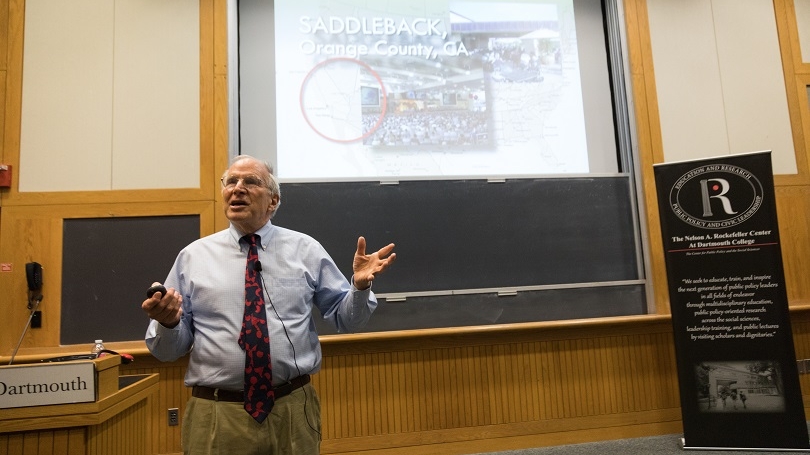
Menu
- Public Policy
- Leadership
- Funding
- News & Events
- About the Center
Back to Top Nav
Back to Top Nav
Back to Top Nav
Back to Top Nav
Lewis Feldstein, the Rockefeller Center 2016-2017 Perkins Bass Distinguished Visitor, delivered the Perkins Bass 1934 Lecture on Tuesday, August 1 entitled “Viewing the World Through a Social Capital Lens: Who You Know Matters, Community Building Counts.”
The lecture reflected on the value of looking at front porches as crime-fighting tools, treating picnics as public health efforts, and seeing choral groups as occasions of democracy. Assessing the impact of social capital, Feldstein drew correlations between states with high levels of social capital and greater child welfare, higher educational performance, lower murder rates, and lower tax evasion. Our relationships have distinct macroeconomic benefit. Social capital is seen in the ways in which we interact with one another, building relationships with those with similar and diverse backgrounds. Feldstein emphasized the strength of “multi-stranded” relationships, focusing on building trust and personable relationships to build a strong, effective base. On this topic, he used examples from “Better Together,” a book he co-authored with Robert D. Putnam about outstanding case studies of social capital across the U.S. He also warned against the negative implications of social capital when used for political partisanship and organizations such as the Klu Klux Klan. The influences of beneficial social capital can make a greater, lasting impact on a community when used to create growth.
Following the lecture, Feldstein participated in a student dinner with a small group. The students and Feldstein discussed political activism, cultural interactions between student organizations and educational perspectives. Feldstein was also questioned about the nonprofit sector, in regards to what they need and what we can do to help. The student was focusing on the planning and lack of outreach needed for nonprofit organizations, aiming to begin her own social capital campaign. Feldstein’s background lent itself to an engaging discussion.
Lewis Feldstein previously served for 24 years as the CEO and President of the New Hampshire Charitable Foundation, a collection of more than 1,800 funds created to maximize the power of giving and charitable support. Mr. Feldstein was listed as one of the top 50 nonprofit executives by the “NonProfit Times” for his work. For 10 years following the fall of the Soviet Union, Feldstein played a key role in building community foundations across Europe, and for seven years worked on the World Bank leadership team as the Bank invested in, and tested, the role of community foundations and private philanthropy in the developing world.
Each year, the Rockefeller Center names a New Hampshire citizen who has made or is making an outstanding contribution in the field of Government as the Perkins Bass Distinguished Visitor. Previous Distinguished Visitors include former NH Governor John Lynch, former Chief Justice of the NH Supreme Court John Broderick, and former Speaker of the NH House Terie Norelli. The Perkins Bass Visitor program is supported by the Perkins Bass 1934 Fund, which was established in April 2012. The fund also supports internships for Dartmouth students working in public affairs in New Hampshire.
Submitted by Alexa Green ’19, Rockefeller Center Student Program Assistant for Public Programs
The views and opinions expressed and any materials presented during a public program are the speaker’s own and do not necessarily represent the views and opinions of the Rockefeller Center or constitute an endorsement by the Center.